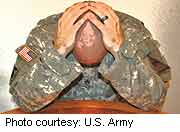
MONDAY, Jan. 3 (HealthDay News) — Post-traumatic stress disorder may have long-term effects on troops — including physical, emotional and cognitive problems — while those who suffer from concussions and mild traumatic brain injuries don’t appear to encounter symptoms over the long haul, a new study suggests.
“Nearly 2 million troops have been deployed to Operation Enduring Freedom and Operation Iraqi Freedom since 2001,” according to background information in the report published in the January issue of Archives of General Psychiatry.
“High levels of combat exposure have been documented among Operation Enduring Freedom/Operation Iraqi Freedom-deployed soldiers, with increased risk of blast exposure and injury, and development of post-deployment mental and physical health problems,” the researchers explained.
Melissa A. Polusny, of the Minneapolis Veterans Affairs Health Care System and the University of Minnesota Medical School, and colleagues surveyed 953 National Guard soldiers who were deployed to combat. They answered questions in Iraq a month before returning home and then a year later.
More than 90 percent of the troops were male and almost nine in 10 were white. Nearly half were under 30 years of age and 87 percent were of enlisted rank.
The survey found that 7.6 percent of the soldiers were considered to probably have post-traumatic stress disorder, or PTSD, in the first survey. A year later, the number had risen to 18.2 percent.
The rate was the same among those who reported concussions and those who didn’t. However, those who reported signs of the disorder in the first survey were more likely to have symptoms such as memory and balance problems, concentration difficulties and irritability after they returned home.
“Although combat-related PTSD was strongly associated with post-concussive symptoms and psychosocial outcomes one year after soldiers return from Iraq, there was little evidence of a long-term negative impact of concussion/mild traumatic brain injury history on these outcomes after accounting for PTSD,” the authors concluded.
More information
For more about post-traumatic stress disorder, visit the U.S. Department of Veterans Affairs.

